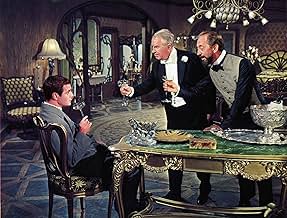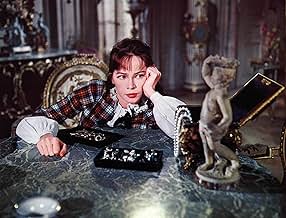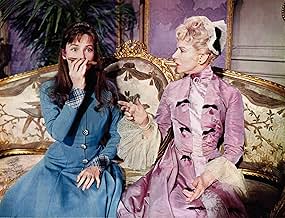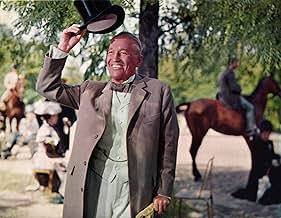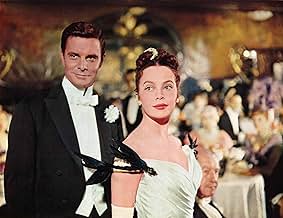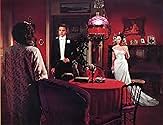Gigi
- 1958
- Tous publics
- 1h 55m
Weary of the conventions of Parisian society, a rich playboy and a youthful courtesan-in-training enjoy a platonic friendship which may not stay platonic for long.Weary of the conventions of Parisian society, a rich playboy and a youthful courtesan-in-training enjoy a platonic friendship which may not stay platonic for long.Weary of the conventions of Parisian society, a rich playboy and a youthful courtesan-in-training enjoy a platonic friendship which may not stay platonic for long.
- Directors
- Writers
- Stars
- Won 9 Oscars
- 22 wins & 9 nominations total
- Girl at Maxim's
- (uncredited)
- Waiter at "Palais de Glace"
- (uncredited)
- A boy at Jardins des Tuileries
- (uncredited)
- Harlequin
- (uncredited)
- Gentleman in Park
- (uncredited)
- Maitre d'Hotel Maxim's
- (uncredited)
- Showgirl
- (uncredited)
- Restaurant Patron
- (uncredited)
- Gaston's Private Secretary
- (uncredited)
- Girl on Horseback at Pré Catelan
- (uncredited)
- Directors
- Writers
- All cast & crew
- Production, box office & more at IMDbPro
Featured reviews
The three principals, Leslie Caron, Louis Jourdan, and Maurice Chevalier, along with the Paris locales helps maintain a distinctively French flavor, especially in the way the characters relate and interact.
For everyone who has commented on the political incorrectness of the story, a closer look will actually reveal the true feminist perspective of Colette's work which was groundbreaking for its time: 1) the story is a commentary and observation of the limited social and economic options for women outside of marriage during the turn of the century Paris, 2) Although Gigi (Caron) never fully masters her lessons and grooming, she is able to capture Gaston's (Jourdan) heart precisely because of her imperfections, and 3) most importantly, it is Gaston rather than Gigi who is forced to truly transform himself and defy the social conventions of the time to bring the story to its resolution.
Compare this to My Fair Lady, which offers similar social commentary but resolves itself in a more standard way: For example 1) Eliza Dolittle only becomes noticeable and lovable after transforming her outward appearance and speech patterns 2) Although Professor Higgins finally realizes his love for Eliza at the end, it is Eliza who is forced to submit her will by effecting a reconciliation that does nothing to resolve any of the issues raised in the scenes leading up to that point.
Definitely see Gigi and judge for yourself. (By the way, the widescreen version is sooooo much better. This is especially apparent in numbers such as "I Remember It Well" where entire characters are forced to be cut out of the screen.)
But this review isn't about "My Fair Lady". It's about one of the greatest musicals ever to be placed on cellulod - "Gigi", exquisite and as light as air!
Where do you start? The score and musical direction by Conrad Salinger and Andre Previn is one of the best. Vincente Minelli's direction frames Leslie Caron and Louis Jourdan wonderously and builds the chemistry between the two photogenic stars. Great support is provided by Hermione Gingold and the redoubtable Maurice Chevalier. Paris has never looked as glorious on film as this - amazing costume design, art direction, and set pieces.
And the songs - absolute classics! Lerner and Loewe really hit their stride with this - "Thank Heaven for Little Girls", "I Remember It Well", "The Night They Invented Champagne", and the beautiful title tune.
This movie has often served as an introduction to Maurice Chevalier for movie watchers, and he illuminates the screen. If you want to see him in another of the greatest musicals, watch "Love Me Tonight" with Jeanette MacDonald.
Thank heaven for this movie - it's a world that I would love to inhabit! I give it 10 out of 10.
Production-wise, it's almost too lavish for its own good. Vincente Minnelli wrings every bit of artistic decor in the trappings, giving the viewer an almost claustrophobic feeling for the interior scenes. The outdoor shots are just as lavish--Louis Jourdan singing the title song among the fountains and architecture of French landmarks.
The cast is perfect. Leslie Caron makes an enchanting Gigi, Louis Jourdan is impossibly handsome as Gaston, and all of the other players were cast with a discerning eye.
But there is no denying that no matter how distasteful some will find the story of training a girl to become a courtesan to be (or how politically incorrect by today's standards), the score is as sparkling as the champagne they sing about. While, in my opinion, the score does not surpass "My Fair Lady" in range and cleverness, it certainly did well enough in winning nine Oscars, including the one for Best Picture of 1958. By all means, it has to be considered one of the last great musicals from the MGM period.
Only drawback: it's a bit overlong and could have used some editing for the slow moments.
But let's face it, this is Americanized Collette. She celebrated the deals and compromises within a sexist order that allowed a lucky few high-class prostitutes to become well-to-do, independent women in fin-de-siecle Paris (and a lot of others to at least make some kind of living). She empowered women, at a time when there just weren't many other opportunities for them to establish real independence (our current categories of PC and non-PC wouldn't have meant much then). It wasn't always pretty, but there was reality in her writing about relations between the sexes that hasn't lost its relevance.
Of course, this had to be soft-pedalled for the American audience - hence the ending, which conforms nicely with middle-class morality on this side of the Atlantic. This is the only "politically" unsatisfactory thing about the movie, however. And it remains superior - both "politically" and as a film - to My Fair Lady, where Eliza is implied to return and submit herself to Rex Harrison at the end, whereas Gigi at least implies that it's Gaston rather than Gigi who is going to have to change his ways.
My only other gripe: Why no dancing from Leslie - and from Vincente Minelli, that peerless director of dance sequences? I guess Lerner and Lowe must have been more in control of this one, and weren't of a mind for rug-cutting. Too bad - there really isn't nearly enough of Leslie dancing on film as it is!
wonderful Maurice in the movie we have simply adored this film. There are so few treasures such as this one. Leslie Caron is nothing short of perfection in this role so young, and so beautiful. And too, I must mention the dashing young Louis Jordan as the much desired by all women, Gaston. I cannot tell you how many times I have heard that beautiful song in my head as he has discovered his Gigi is a "woman" now and not a child. My sister and I will forever keep this movie close to our hearts. I suggest anyone who is a romantic or loves musicals to go and rent this one right away!!
Oscars Best Picture Winners, Ranked
Oscars Best Picture Winners, Ranked
Did you know
- TriviaWhen Alan Jay Lerner met Leslie Caron in London to discuss the film with her, he was surprised to discover that Caron, who was of French birth, had become so immersed in the English culture that she had lost her French accent.
- GoofsDuring Gaston's song by the pond thinking of Gigi, there is a fence in the pond forcing the swans to stay in close background. The swans, obviously confused yet undeterred, keep swimming into the fence attempting to get to the swan in deep background on the other side of the pond.
- Quotes
Aunt Alicia: Love, my dear Gigi, is a thing of beauty like a work of art, and like a work of art it is created by artists. The greater the artist the greater the art. And what makes an artist?
Gigi: Cigars and jewelry?
Aunt Alicia: Gigi, you're from another planet.
- Alternate versionsIn some prints shown on television, we see still photos of Leslie Caron part of the time during the song "Gigi", instead of seeing Louis Jourdan singing. (This occurs after the verse and first chorus, when the orchestra plays the song while Jourdan only exclaims "Gigi!") As shown currently, we see Jourdan singing throughout the whole song, as in the theatrical release.
- ConnectionsEdited into Histoire(s) du cinéma: Une histoire seule (1989)
- SoundtracksThank Heaven for Little Girls
(uncredited)
Lyrics by Alan Jay Lerner
Music by Frederick Loewe
Performed by Maurice Chevalier
- How long is Gigi?Powered by Alexa
- What is 'Gigi' about?
- Is 'Gigi' based on a book?
- What is a courtesan?
Details
Box office
- Budget
- $3,319,355 (estimated)
- Runtime1 hour 55 minutes
- Color
- Sound mix
- Aspect ratio
- 2.35 : 1
Contribute to this page



